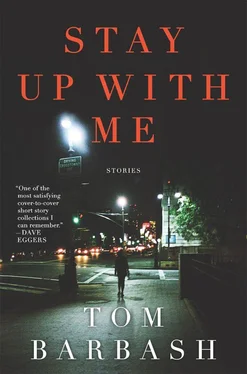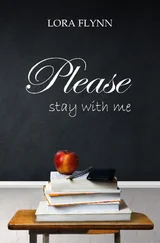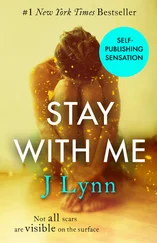He stepped through the soft ground around the building to the side window and peeked through. He saw only a small group twenty feet from the podium talking about matters that had nothing to do with him. He moved stealthily for his jacket, then walked quickly out the door again.
When he made his way through the lot again under the full yellow moon, he felt a hand on his back, fingers curling at his collar. Two cars had boxed him in. His heart raced, and his hands balled into fists. He turned and the woman in the long coat stood with her arm around a teenaged girl. The girl looked frightened, an infant animal on a highway.
“I just wanted you to meet my daughter,” the woman said, and she stood back, away from the light. A man in an army jacket stood watching alongside a lanky boy resting against a car.
“She’s a National Merit Scholar. She’s got herself a full scholarship to Notre Dame University,” the woman said. “She speaks French and Latin and she grew up in this town.”
For a moment Kistler couldn’t place himself. He did not know what he was doing out in the mud with these people. He glanced back at the firehouse and remembered. And then the girl began to speak in a foreign voice, in what Kistler guessed was Latin. It was like nothing he had ever heard. It sounded to him like a benediction. He began to shiver. As the girl spoke, Kistler’s hand reached up and gently touched her cheek. It was as warm and smooth as sunlight.
W hen I was twenty-five, Abby was seven. When I was thirty-two, she was fourteen. This is something I dwell on, though I know it isn’t constructive.
She is more worldly than a lot of thirty-year-olds I know, more so than my ex-wife for instance. Abby is comfortable with herself, comfortable with me, and still I see myself meeting her at a playground when I’d just married Lynn and started my life. Abby’s in overalls standing near a swing set and I’m in a rented tuxedo, watching her.
For nearly two months Abby’s been living with me and we almost never step out unless we have to. I teach painting at the college on Wednesdays and build furniture in my house, and Abby’s looking into grad school. Anthropology or psychology. She wants to see the world, which I’d like to do with her if I can save up the cash to make it happen.
It is inhumanly cold here in Ithaca, and the streets are sheets of ice. We haven’t seen the sun for seventeen days, which means we have to find ways to keep indoors interesting. Like playing strip backgammon or downloading music from places like Iceland or Tunisia or making five-course dinners. Or inventing games. We tell the life stories of bit characters in the movies we see, then compose new story lines for them in which they get rich, or end up in prison.
She is only nineteen, but I’d swear she’s lived longer than me, or just learned more from staying up reading every night, or writing letters to her future self. (“It isn’t a diary, I hate diaries.”) She is nocturnal; daylight unnerves her. If she goes out in the morning to get us coffee, she wears my Blue Jays hat, tipped over her forehead, and a pair of sunglasses.
Abby says I’m the first one to get her talking about her messed-up past. I open her up, she says. We start our talks when it’s been dark a few hours and we’ve eaten dinner, drunk some wine, maybe smoked a little weed. Then she says something that sends me spinning; never fails.
One night last week, Abby made some tea and put a Sigur Rós CD on and told me a story about a crazy aunt who lived in Montana, painted landscapes, and eventually hung herself, and she caught the woman’s voice and gestures disturbingly well, shaking like an old lady and then easing into a calm, low-voiced drawl.
Her body is so damned perfect, even, or especially, with the ten extra pounds she’s put on living here, which have softened her edges. Her skin is pale and freckled on her shoulders, and under her light green eyes. I watched her speak as she moved her arm in drunken brushstrokes, and when she looked at me, she fell silent, as though sorry she’d told me anything. Again, I felt like a voyeur.
“Go on,” I said. “Keep going.”
She said, “I don’t want to. Let’s go to bed.”
Another night she told me how she spent a summer living on a beach. Not in a house near the beach, but in a sleeping bag with her sister and her mother on the beach in Isla Vista, California. And they begged food.
Picture this. We’re eating a huge meal of eggplant lasagna and sharing a ten-dollar bottle of wine and she’s telling me about begging for food because her mother figured she could store up the welfare checks and take a trip.
“We got taken in a few times, and we snuck into a house for two weeks,” Abby says. “It was furnished and everything, with a big-screen TV, and art on the walls, but we didn’t turn anything on unless we had to. We snuck out the back door when we heard a car pulling in and that was that.”
She showed me a Polaroid of her and her sister, about seven and eight, waking up in a big blue sleeping bag, with their hair matted against their faces and their mother sitting next to them, wearing sunglasses and smoking a cigarette.
I started thinking about where I was that summer: twenty-five and dropped out of college. I worked that summer painting and rehabbing houses with my father. But what if I’d decided to drive out west like a lot of people did and I’d seen those three sleeping on the beach? What would I have thought?
That was the summer I fell in love with Lynn and locked myself in Ithaca for another ten years.
“Where would you go now if you could go anywhere?”
“Somewhere warm and cheap,” she said. “Somewhere like Mexico.”
Like someone’s grandfather I wake at six, and I start in cutting and shaping wood. I’m building a rocker this week; I’m smoothing the spindles with a sander and I’m setting the headboard on the stiles, which are perfect this time, not too thin or too blocky. This was supposed to be for the owner of my favorite bar but I’m thinking of giving him a different one I made over the summer. This one is Abby’s.
My workroom is spacious and drafty, with hardwood floors covered in wood chips, paint, and dust, which holds the room’s light, like gauze. My father built this house, along with five or six similar ones in this town, big rambling things with front porches, fireplaces, and shingled garrets on top and high ceilings and mullioned bay windows, the kind of places that look instantly old and cost half your paycheck to heat. While I work, Abby sleeps, eight feet up, twenty feet away in my loft. She snores. She’s the only woman I’ve known who does. I can hear her sometimes in the kitchen, but I never tease her about it because I know why she snores. Her mother broke her nose five years ago in a fight, a few months before she died. I’m the only one who knows that.
Abby says we fucked each other to death in a previous life, that it was written on our tombstones. She’s joking, but it would explain a lot. I have never before been so lost in something like this, where it can happen at any instant in any room without notice. But Friday night, after we’ve been kissing and working things up to a high boil, Abby switches the rules on me. She pulls at the end of my belt and then as if remembering something, she lets it drop. We’re on the couch in my living room.
“You think we could go a night without doing this?” she asks me.
“A whole entire night?” I ask, smiling, and I reach back to touch her thigh.
“I’m serious,” she says. “Let’s see if we can. Let’s see if we can sleep in separate beds. Cold turkey. Twenty-four hours.”
Читать дальше












